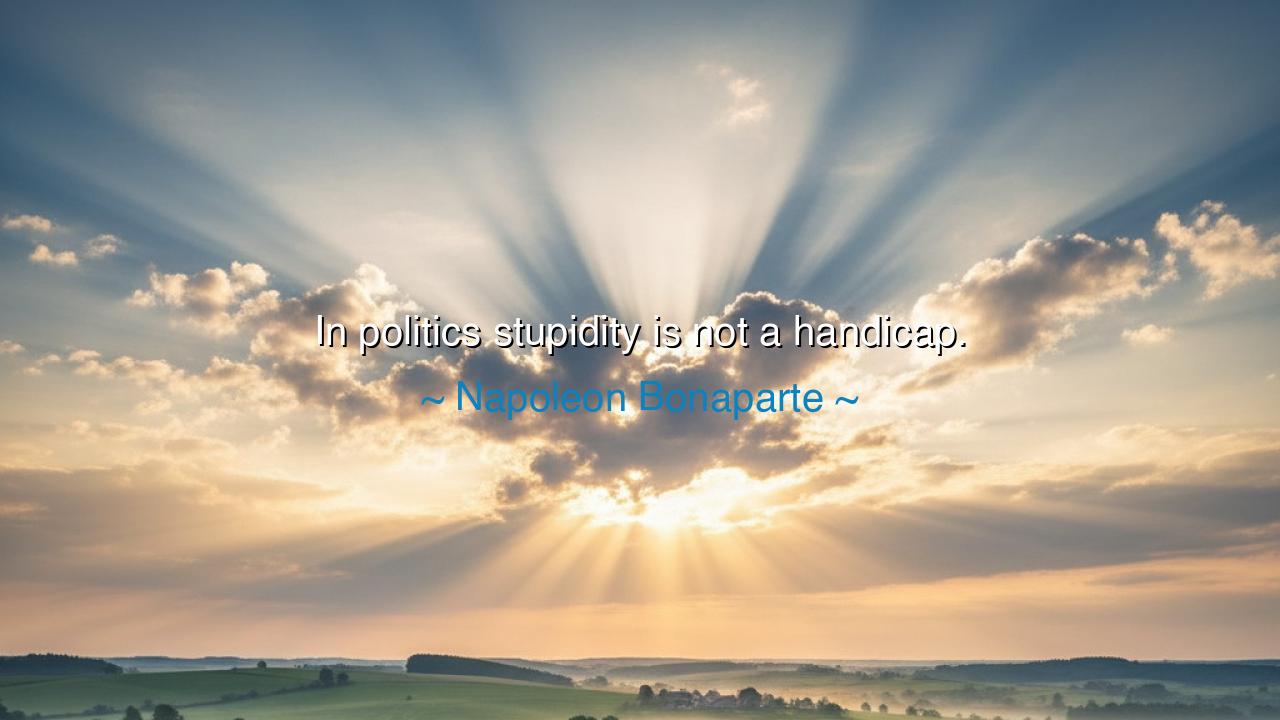
In politics stupidity is not a handicap.






The words of Napoleon Bonaparte, “In politics stupidity is not a handicap,” are a sharp and cynical observation from one who ruled with both brilliance and ruthlessness. In them lies the recognition that, unlike on the battlefield where wit and strategy decide life or death, in politics appearances and manipulations may outweigh true wisdom. Stupidity—whether real or feigned—can be cloaked by ambition, inherited power, or the passions of the crowd. Thus, Napoleon warns us that folly does not bar entry into the halls of power.
In the ancient spirit, this is not merely mockery but revelation. For throughout history, rulers have risen not through intellect, but through birthright, wealth, or charm. Some have concealed their ignorance beneath the robes of authority, others have wielded simplicity as a weapon to win the hearts of the people. In politics, unlike in philosophy or science, truth and reason are not always the measure of success. The crowd may crown the loudest voice, not the wisest.
History bears witness in the tale of Caligula, emperor of Rome. His reign was marked by extravagance, madness, and folly, yet for years he sat upon the throne of the world’s greatest empire. His excesses weakened Rome, yet his “handicap” did not keep him from power—it only revealed how fragile political systems are when surrounded by fear, spectacle, and blind obedience. In this, we see Napoleon’s words carved into history: wisdom is not required to rule, only power and its appearance.
Yet, paradoxically, stupidity in politics may even serve as a mask. Some leaders have hidden their cunning beneath a guise of simplicity, disarming opponents by appearing weaker or less clever than they truly were. Others have leaned upon advisors and generals, surrounding themselves with those who compensated for their own shortcomings. Thus, what would cripple a man in war or philosophy is often no true obstacle in the marketplace of power.
So let this teaching endure: the throne does not always rest upon wisdom. In politics, folly can sit beside brilliance, and ignorance can wear the crown as easily as genius. Napoleon, master of empire and exile, knew this better than most. His words warn us to look beyond titles and offices, for the presence of authority does not guarantee the presence of wisdom. The people must be vigilant, for where folly rules unchecked, nations themselves may bear the cost.






UGUser Google
I’m not sure if I entirely agree with Napoleon’s view. While it’s true that some politicians don’t always seem particularly intelligent, doesn’t this quote oversimplify the complexity of politics? Perhaps it’s more about how one plays the game, leveraging emotion and public sentiment, than about raw intelligence. Could it be that political success requires a different kind of intelligence—one based on strategy and communication, rather than traditional intellectualism?
TYTHIEN YET
This quote might be seen as a criticism of how politics rewards opportunism over genuine intelligence. Is it possible that a lack of critical thinking or awareness can actually be advantageous in certain political environments? Or does Napoleon’s statement reflect the nature of political systems where image and influence often outweigh qualifications? Shouldn’t we expect more from our leaders, especially when it comes to being well-informed and thoughtful?
POPikachu Onlai
Napoleon’s statement might ring true in many ways, especially in today’s political climate. The way some politicians rise to power despite their lack of substance suggests that political success may depend on factors like appeal, control of the narrative, and media presence, rather than intellectual depth. But is this a flaw in politics itself, or just a reflection of how power and influence are wielded in modern society?
NV23.Phu Nguyen Van
This quote has a cynical tone, implying that politics often rewards those who are less thoughtful or informed. Could it be that politics, in many ways, is more about power, charisma, and the ability to manipulate people, rather than intelligence or wisdom? It seems like we’ve seen politicians who seem less informed than they should be still rise to power. But does this suggest something deeper about the way political systems are structured?
FZfl_ zed
Napoleon’s quote seems to suggest that in politics, intelligence isn’t always the key to success. It’s unsettling to think that people who may lack insight or critical thinking skills can still thrive in political environments. Is it possible that populism and manipulation are more important than actual intelligence in the political sphere? How much of modern politics is driven by strategy and appearances rather than substance?